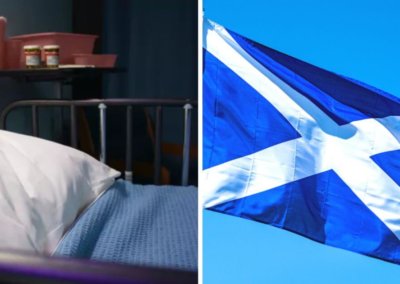A mother of two was found dead two days after emailing an assisted suicide centre in Switzerland.
According to her family, Hannah Jean Elizabeth Martin had suffered with mental health issues since she was thirteen. At only 25, the mum of two was found dead in her home in January 2019.
Prior to her death, it has been discovered that she had researched suicide methods and even contacted the Swiss assisted suicide centre, Dignitas, via email saying: “I want to die. I don’t want this life I have been given”.
Hannah’s own mum, Louise Whelan said Hannah “lit up the room when she entered it and was the life and soul of the party. But she wasn’t able to cope with things at certain times and we were used to rallying round her and trying to make things better”.
When Hannah was 15, she was admitted to hospital after an overdose. Before her daughter was born in March 2011 she travelled to Germany in search of her father but found “no trace of him”, Mrs Whelan said.
“I want to die. I don’t want this life I have been given”.
Eight days before Hannah was found dead, she admitted to her GP that she hadn’t been entirely honest about the state she was in and that she needed help.
Her mum said: “[Hannah] said she hadn’t been honest [with her GP] before but she was going to be now. She wanted to come clean about how she was feeling and get some help”.
Her GP was so concerned about her mental status that he called Lancashire and South Cumbria NHS Foundation Trust mental health crisis team to see if Hannah could have a face-to-face appointment. However, there was a significant delay.
The coroner noted that the 17-day gap was a “longer than average” waiting time for a non-urgent referral with the service, which is typically 10 days.
Seven days later on 21 January, Hannah’s best friend from school, Rachel Burrow, and Daniel Walton, the father of one of Hannah’s children, realised something was amiss. Mr Walton smashed a window to gain entry into Hannah’s home where she was discovered dead.
Hannah’s brother, Ben Martin, said that after his sister’s death he looked through her internet search history, emails and diary entries. In the weeks before she died Hannah had attempted to research suicide methods.
The coroner asked Mr Martin: “The impression you got was that Hannah was considering taking her own life but she didn’t want any pain?”
“Yes”, he replied.
The inquest heard that on 19 January, two days before she was found dead, Hannah had sent an email to Switzerland-based assisted dying clinic Dignitas in which she wrote: “I want to die. I don’t want this life I have been given”.
Baroness Meacher’s assisted suicide bill
Chair of the pro-assisted suicide group, ‘Dignity in Dying’, Baroness Meacher’s Private Members’ Bill on assisted suicide received its First Reading in the House of Lords in May this year and received its Second Reading on 22 October.
If the Bill passes all its stages in the House of Lords, it has a chance of being debated in the House of Commons early next year.
The Prime Minister has indicated that he does not support a change in the law.
Right To Life UK spokesperson, Catherine Robinson, said: “Hannah’s story is nothing but a tragedy, and our heart goes out to her family and friends at this time. Unfortunately, her story is all too common and is a reflection of where we are going as a society when we legitimise death as a viable option of pain relief. It is therefore more important than ever that legislation such as Baroness Meachers’ Bill is stopped, people such as Hannah are given true and proper health care for both mental and physical conditions, and that we as a society are better equipped to value, support and upbuild those most vulnerable amongst us”.












